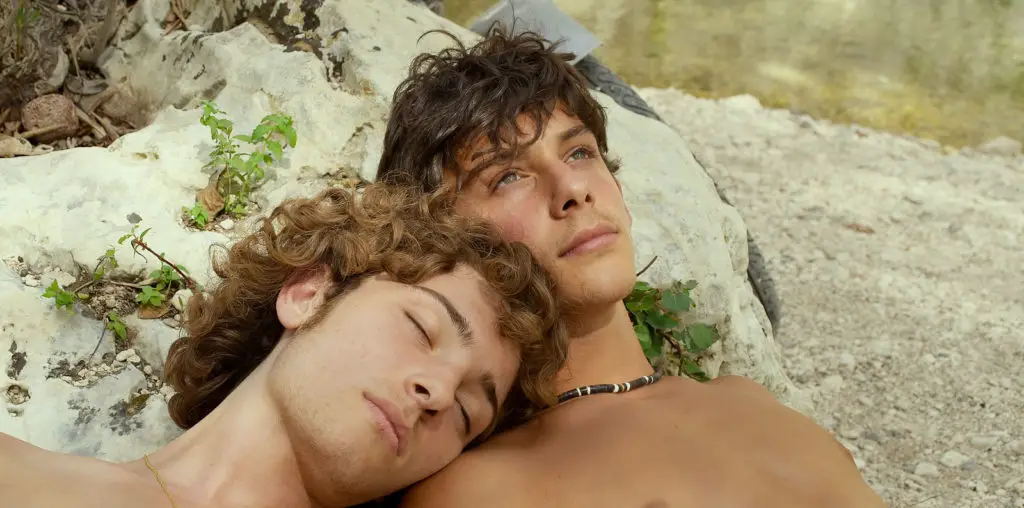
We all love love (most of us at least). We’ve all been in love, been hurt by love, and our lives changed by love. Good or bad, it’s that one shared experience that binds us together as humans. We talk about love with one another and also lament about love. We also make movies about love (yes, a beautiful segue). And today’s entry is Love or Lust by director Christian Belz Parenteau and writer/lead actor Simon Boisvert.
Mark (Simon Boisvert) and his much younger girlfriend Stephanie (Jillian Harris) arrive at a beautiful mountain home for a weekend getaway. Almost immediately, there are problems between the two lovebirds, who have been in a relationship over the last seven years. Stephanie uses the tense argument to break up with Mark. Mark is surprised, and the tells him that she’s been wanting to do this for some time. Then things get a little too personal for Mark as they talk about their age difference. In the end, Stephanie takes the car and drives home.
Deciding to stay behind in the mountains, Mark by chance meets his old college sweetheart, Julie (Izabelle Moreau). Almost immediately the two pick up where they left off, meaning the rekindling of their old, romantic feelings. We know Mark just broke up with his girlfriend, and Julie is recently divorced, but the two make an instant connection. They talk about their past relationships, theorizing about why they broke up so long ago, and then Julie wakes up the next morning, and they talk some more during breakfast.

“Mark by chance meets his old college sweetheart…Almost immediately the two pick up where they left off…”
Get it so far? Love or Lust is a dialogue-heavy film bouncing from one conversation to the next and moving from one scenic location to the next, just to break things up a little. We start with a discussion by the car in front of the house, moves to the living room, then the bedroom, and on to the kitchen, picnic spot, shower, golf course, and bathtub.
The film’s narrative takes its shape from the discussion topics between whatever two actors are on screen at the time. It starts with the discussion of Mark and Stephanie state of their stale relationship and whether they should break up. It then moves on to Julie and a review of their romance in college. They then discuss why it didn’t work, only to move on to why this second chance for Mark and Julie is stronger than the first. Both characters are incredibly insightful about their flaws and failures, almost as if they both had extensive therapy on their own.
In case I’m being too subtle, the primary problem with Love or Lust the constant talking and talking. There’s nothing wrong with talking. It’s one way we communicate and works fine in written and audio form. The problem is this is a film, which is a visual medium and a storytelling medium. The overuse of dialogue ultimately hurts the final product.

“The overuse of dialogue ultimately hurts the final product.”
Let’s start with what is said. I thought the conversation about the twenty-year age gap between Mark and Stephanie was interesting, then again, I’ve had conversations like this throughout my life while just hanging out with friends. While interesting, there was nothing profound or new being said that hasn’t been said before. You can tell that writer/lead actor Boisvert has thought a lot about his script and has a good grasp of the subject, he just needed to final an interesting angle on the subject as a foundation for the story. The script never felt lazy, but the over-emphasis placed on dialogue created an incredibly dense script.
What’s wrong with the dialogue-dense script? You give no room for the actors to act. Instead, they are merely reciting the dense dialogue. The task of acting is making the dialogue sound interesting and real, which is perfect for an audiobook but not a motion picture.
First, it inhibits an actor’s ability to create a character with depth. What I know of Julie is that she’s a divorced business-woman in the tech field, who once dated Mark. She talks about her experiences and how they affected her, but what we don’t see is how the good and bad moments of her past informs her character today. Consideration must be paid to why/how characters act, speak, express emotions, and feel in the situation of the story. Creating and performing roles with emotional and intellectual depth is the reason actors act and why they become bored simply reciting dialogue. Generally speaking, the difference between Julie and Stephanie is one is young, and the other was once young and now is older. Otherwise, their personalities are pretty much interchangeable (In fact, that point is made in the actual script).
I’ve said this before in other similar reviews, but here we go again. “Show! Don’t Tell!” Don’t tell me you’re heartbroken. Show me! Don’t tell me you’re in love. Show me! There is one moment in the end when this happens. It was a moment of betrayal and played itself out wonderfully with very few words. I’ll even add to that the final scene had no words, but summed up Mark’s character perfectly…with no words!

Love or Lust (2017) Directed by Christian Belz Parenteau. Written by Simon Boisvert. Starring Simon Boisvert, Izabelle Moreau, Jillian Harris.
4 out of 10 stars

